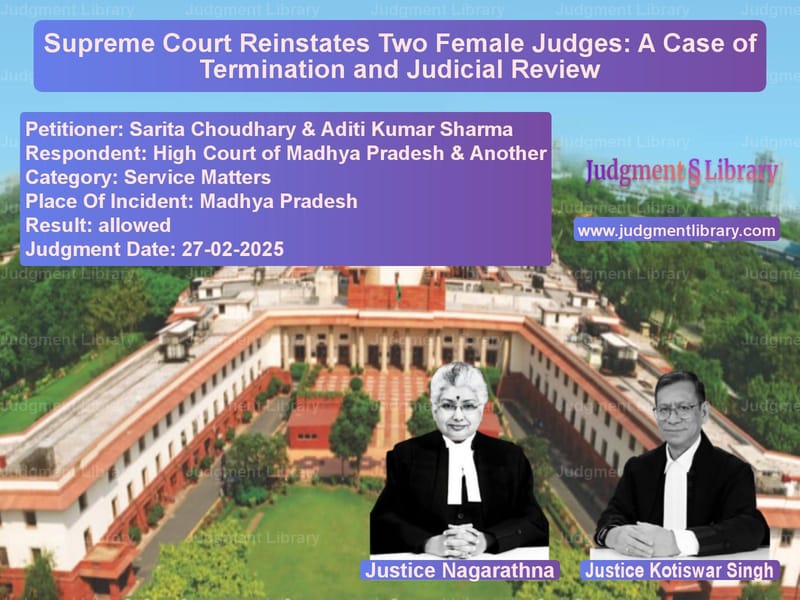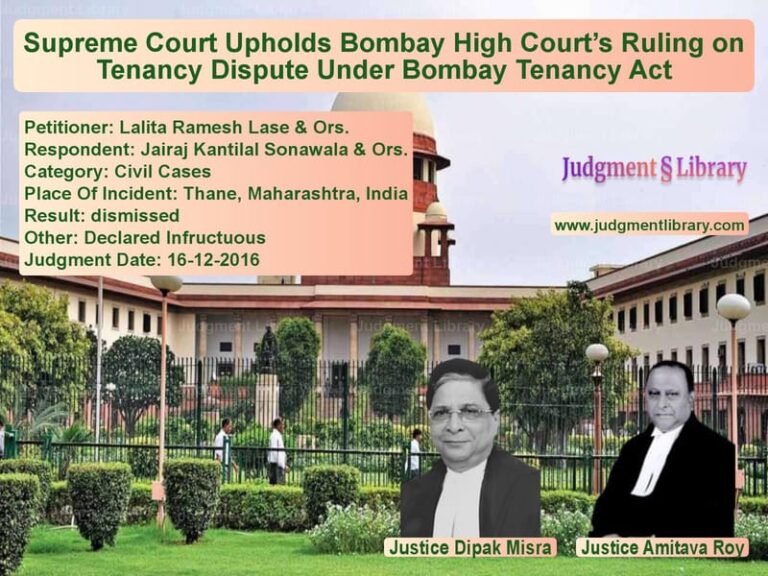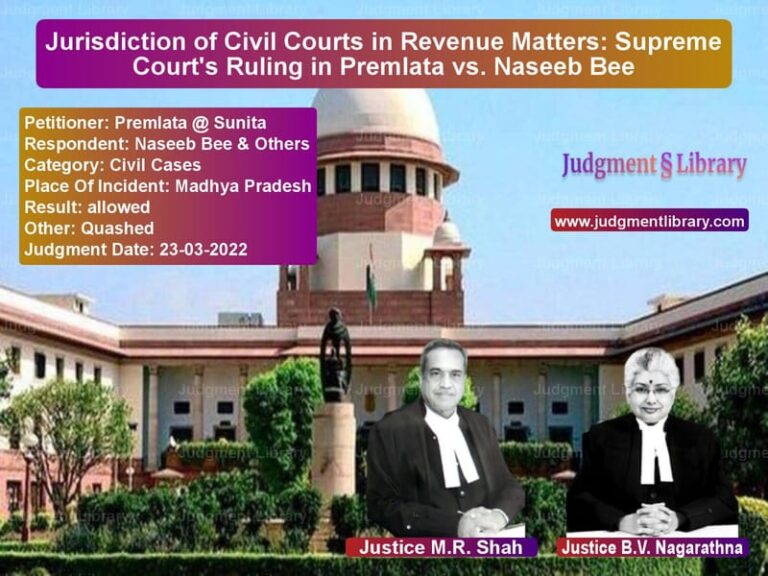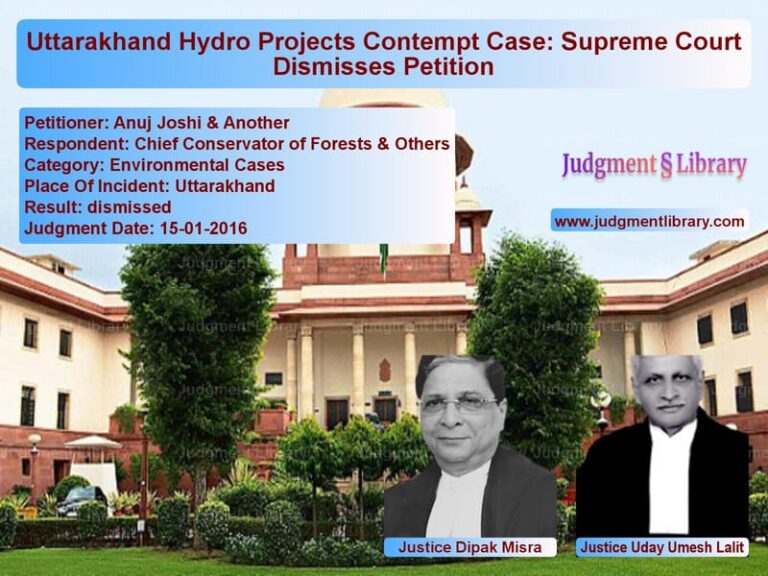Supreme Court Reinstates Two Female Judges: A Case of Termination and Judicial Review
The case before the Supreme Court involved the termination of two female Judicial Officers, Sarita Choudhary and Aditi Kumar Sharma, from the Madhya Pradesh State Judicial Service. The Supreme Court had to determine whether their termination was punitive and arbitrary, or if it was a simple case of non-confirmation during probation. The petitioners argued that their termination was based on biased assessments and unsubstantiated complaints, while the High Court of Madhya Pradesh defended its decision, stating that the officers did not satisfactorily complete their probation period.
Background of the Case
On May 23, 2023, the Government of Madhya Pradesh issued termination orders for six female judicial officers, including the two petitioners. Following interventions by the Supreme Court, four of the terminated officers were reinstated. However, the High Court maintained that the termination of Sarita Choudhary and Aditi Kumar Sharma could not be revoked due to adverse remarks and complaints against them.
Petitioners’ Arguments
The petitioners, represented by senior counsel, argued the following points:
- Their termination was based on biased and unfair assessments in their Annual Confidential Reports (ACRs).
- They were not given a fair opportunity to respond to complaints against them, some of which were either withdrawn or deemed unsubstantiated.
- The probation period was unfairly extended beyond the prescribed maximum of three years.
- Their termination orders contained implicit stigma, affecting their future career prospects.
- They were subjected to harsher scrutiny compared to their male counterparts.
Respondents’ Arguments
The High Court of Madhya Pradesh defended its decision with the following points:
- The officers did not meet the required performance benchmarks, particularly in case disposal rates.
- The ACRs contained adverse remarks about their judicial work, punctuality, and administrative skills.
- There were multiple complaints against them, some of which pointed to procedural lapses and inappropriate courtroom behavior.
- The termination was a routine administrative action and not punitive in nature.
Supreme Court’s Observations
The Supreme Court, led by Justices Nagarathna and Kotiswar Singh, carefully examined the records and found the following:
- Several adverse remarks in the ACRs were communicated to the petitioners after their termination, violating principles of natural justice.
- The complaints against them were largely advisory in nature and did not warrant dismissal from service.
- There were inconsistencies in how different officers were assessed, leading to potential discrimination.
- The termination orders were punitive as they carried an implicit stigma, affecting their future employment.
Key Verbal Arguments of the Court
“The grievance of petitioner no.1, that she has been defamed by the statements of the police officials and was humiliated in open court, is totally misconceived.”
“It is the duty of the Court to reach the truth of the matter, and such an exercise may demand putting forward certain questions and suggestions which may be uncomfortable to some.”
“The performance of a probationer must be considered holistically, and arbitrary assessments cannot be the basis for termination.”
Final Verdict
The Supreme Court ruled in favor of the petitioners, setting aside their termination and directing their reinstatement with the following conditions:
- They would be placed back in service with continuity of tenure.
- No back wages would be paid, but their service tenure would be considered for pension and other benefits.
- They would regain their seniority, subject to a satisfactory review after a probationary period.
Impact of the Judgment
This ruling sets a precedent for judicial accountability in handling probationary terminations, particularly in cases involving gender bias. The judgment reinforces that performance assessments must be fair, transparent, and communicated in a timely manner. It also underscores the importance of protecting judicial officers from arbitrary dismissals based on vague or unverified complaints.
Read also: https://judgmentlibrary.com/supreme-court-rules-against-msrtc-in-unfair-labor-practice-case/
Petitioner Name: Sarita Choudhary & Aditi Kumar Sharma.Respondent Name: High Court of Madhya Pradesh & Another.Judgment By: Justice Nagarathna, Justice Kotiswar Singh.Place Of Incident: Madhya Pradesh.Judgment Date: 27-02-2025.
Don’t miss out on the full details! Download the complete judgment in PDF format below and gain valuable insights instantly!
Download Judgment: sarita-choudhary-&-a-vs-high-court-of-madhya-supreme-court-of-india-judgment-dated-27-02-2025.pdf
Directly Download Judgment: Directly download this Judgment
See all petitions in Employment Disputes
See all petitions in Termination Cases
See all petitions in Public Sector Employees
See all petitions in Disciplinary Proceedings
See all petitions in Judgment by B.V. Nagarathna
See all petitions in Judgment by N. Kotiswar Singh
See all petitions in allowed
See all petitions in supreme court of India judgments February 2025
See all petitions in 2025 judgments
See all posts in Service Matters Category
See all allowed petitions in Service Matters Category
See all Dismissed petitions in Service Matters Category
See all partially allowed petitions in Service Matters Category







